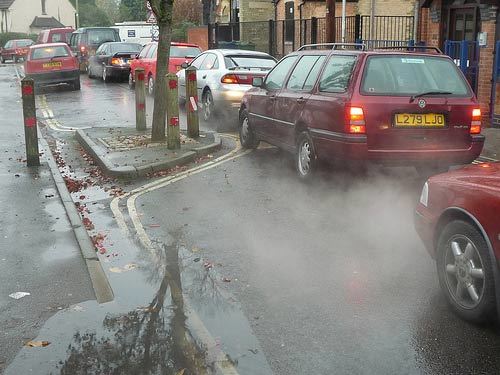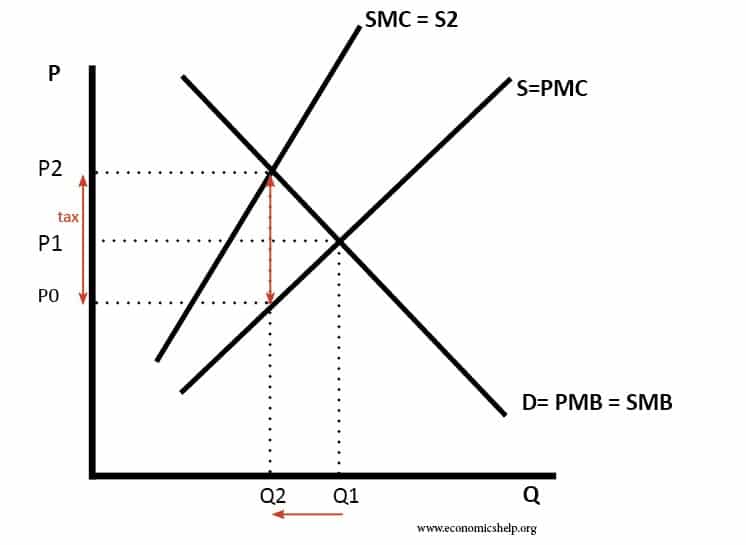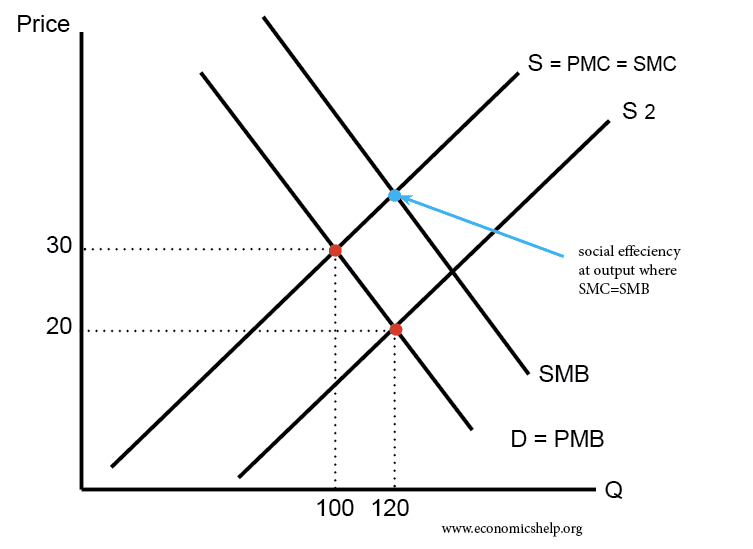what are two ways in which governments can help to reduce air pollution?
What policies tin a authorities use to reduce pollution?
Pollution is a negative externality – a cost to society. To reduce pollution, the government can use four main policies – taxation to heighten the price, subsidise alternatives, regulations to ban certain pollutants and pollution permits.

Government policies to reduce pollution
- Tax. due east.g. Carbon taxation, which makes people pay the social toll of pollution.
- Subsidy. e.g. subsidy of alternative free energy sources.
- Pollution permits, e.g. carbon trading schemes where firms are given the correct to pollute a sure amount; these permits tin can be traded with other firms.
- Regulation. Limits on a number of pollutants that can be discarded into the atmosphere.
- Irresolute consumer behaviour – due east.g. through advertisement, nudges.
one. Tax
The idea of a tax is to brand consumers and producers pay the full social toll of producing pollution. For example, petrol tax or a carbon taxation.

In this case, the social marginal cost (SMC) of producing the skillful is greater than the private marginal cost (PMC) The departure is the external cost of the pollution. The tax shifts the supply curve to S2 and therefore, consumers are forced to pay the full social marginal cost. This reduces the quantity consumed to Q2, which is the socially efficient outcome (considering the SMC=SMB)
Evaluation
- The advantage of this scheme is that the government raises substantial revenue, which could be used to finance other pollution reduction schemes (e.g. subsidising alternatives)
- It provides a market incentive for firms to offer more efficient engines, which cause less pollution. Increased petrol tax has created an incentive for firms and consumers to switch to less fuel intensive engines.
- One drawback of tax is that demand may be quite inelastic and that an increase in petrol taxation may do little to reduce demand and just marginally reduce the amount of pollution. Though in the long term, demand may become more elastic as people switch to other forms of ship over time.
- Another potential problem is that it can be difficult to implement greenish taxes due to administration costs or it is difficult to know how much to revenue enhancement.
- In practical terms (non-economic upshot), the difficulty is often political resistance – people never like paying new taxes, even if there is a long-term goal of reducing pollution.
- More item on pros and cons of carbon tax
2. Pollution Permits
Pollution permits are a market-based scheme aimed at reducing pollution and trying to encourage firms to reduce the quantity of pollution they create. Permits create a financial incentive to pollute less considering you tin can then sell your excess permits to other firms. In theory, it can be a good way to reduce pollution, using the incentives of the market.
But, in practice, information technology can be difficult to implement. It is hard to know how many permits to give out. If the authorities is too generous, in that location will exist piffling pollution reduction. If the government is too strict in implementing permits, firms may complain it adversely affects output because they can not get enough permits. This could harm economic prosperity.
Some other practical difficulty of permits is that information technology is difficult to measure the corporeality of pollution created. There may be an incentive to cheat and hide the amount of pollution a firm creates. This could make the scheme ineffective.
3. Subsidies
A tax may be ineffective if in that location are no practical alternatives. Withal, if the government subsidies alternatives, then firms and consumers will exist more willing to switch. For example, solar power is an alternative to called-for coal. A authorities subsidy can make solar power competitive and encourage its development. The subsidy is justified because the development of solar power has a significant positive externality. (See: how close solar power is to other forms of energy)

Run into: subsidy on positive externality
The trouble of subsidies is that in that location is always a danger authorities subsidies could be misused. Firms may take the subsidy only proceed the money for actress profit rather than for developing the alternative free energy source. The government may lack the proper information on what types of free energy or firms to subsidise. This may lead to public coin existence wasted, with little reduction in pollution.
iv. Regulation
The EU has created many regulations for limiting the corporeality of pollution in the air. European union pollution regulations This sets strict limits on the number of pollutants put into the air. The reward of regulation is that they create conspicuously defined goals and can make sure that pollution levels are actually reduced rather than relying on market-based incentives, which may or may non work.
In the 1950s, the Clean Air Human activity (1956) was very effective in reducing the visible smogs from cities, such as London. The deed banned the burning of coal in domestic homes in major cities.
The main drawback of regulation is that they can exist difficult to enforce, e.one thousand. having regulations on air pollution levels, doesn't say how that will exist achieved. Yous may however need taxes or directives to make certain air pollution levels are reduced.
5. Changing consumer behaviour
Another strategy would be to encourage consumers to change their behaviour. For example, raising awareness of the environmental costs of leaving on heating/air conditioning.
The authorities could likewise apply 'nudges' from behavioural theory to encourage different behaviour which discourages pollution. For example, signs at schools 'please turn off the engine' when waiting to pick people up' – a elementary reminder encourages people to turn off engine reducing pollution.
Alternatively, if the government offer improve cycle lanes and firms offer showers at piece of work, these minor nudges may encourage people to cycle to work rather than drive.
vi. Gratis marketplace solutions
Some debate solutions to pollution can come up from the gratis market place and we don't need whatsoever government intervention. For case, in recent years technological evolution, falling costs of solar power mean that cleaner energy is now more competitive than many fossil fuels. All the same, we tin't always exit to the free market considering of the free-rider effect. Smog which used to bane London only ended when the authorities banned domestic coal fires in major cities.
Related
- Carbon tax
- 10 Reasons not to cut petrol taxation
- Tax on unhealthy foods
- Polluter pays principle
neeleytwerfell1939.blogspot.com
Source: https://www.economicshelp.org/blog/11077/environment/policies-to-reduce-pollution/
Enviar um comentário for "what are two ways in which governments can help to reduce air pollution?"